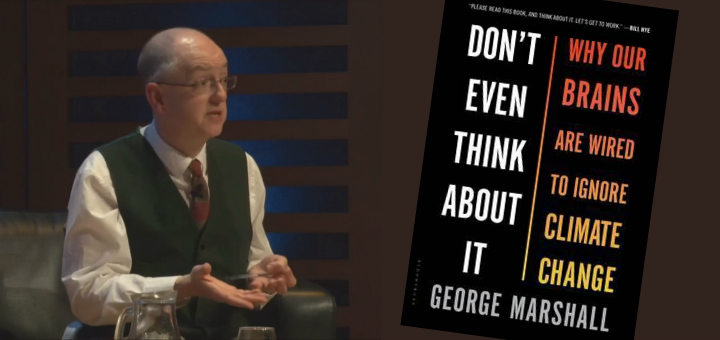Don’t Even Think About It

George Marshall’s book on climate change communication explains why we can understand the risks of this existential threat and yet do so little about it.
I’ve been on holiday this month and I found the time to read George Marshall’s book Don’t Even Think About It. The book’s tag line sums up it’s big theme : ‘Why Our Brains are Wired to Ignore Climate change.’ It was written a few years ago but I first heard about it at last year’s Footprint Conference when Nick Nuttgens and Tim Allen gave a workshop about climate conversations.
Over quite a number of concise chapters, George Marshall explains why society seems unable to deal with the existential threat that is our climate crisis. If you’re reading this blog, you’ve probably already accepted the significance of climate change, but we’re all guilty of forming complex narratives to explain our actions and our inactions. For example, we might overstate the importance of putting out the recycling and underestimate the impact of our long-haul flights.
Socially ingrained behaviours are difficult to change, particularly when there is a collective norm of silence. When was the last time that you talked to somebody about climate change? I can’t recall any family dinner when this was discussed. This is important, because major change will require social movements, and this requires people sharing narratives with conviction:
We also have a virtually unlimited capacity to accept things that might otherwise prove to be cognitively challenging once they are supported within a culture of shared conviction, reinforced through social norms, and conveyed in narratives that speak to our ‘sacred values.’ p.229
We should also be listening to people who disagree with us. George Marshall’s book spends more time exploring the motivations of climate deniers than climate activists. The truth of this is self-evident when you consider that we’ve known about climate change for over 40 years and yet decision makers still aren’t acting effectively. By breaking down differing viewpoints, George Marshall demonstrates that action on climate change needn’t be determined by political affiliation. He’s presented a valuable TED Talk on the subject which is worth watching.
I was particularly interested to understand how the framing of climate change as an ‘environmental issue’ has been counterproductive, detaching it from economics, employment, security and justice. It has limited climate change’s audience, and created enemies out of people who see environmentalism as left-wing:
Climate change does not belong to environmentalists and is not even environmental. Of course, it includes environmental concerns and impacts, but it is so much bigger than that. As soon as we label it, we restrict our understanding of it. (p.237)
‘Don’t Even Think About It’ shows some of the real mistakes that campaigners have made so far. However, it leaves you with a sound understanding of how to move forward. Even if you’re not a campaigner, don’t underestimate the impact of simply talking about climate change with friends, family and even strangers. A narrative told with conviction can help to change the social norms around us. We need to break the silence.
‘Don’t Even Think About It : Why Our Brains are Wired to Ignore Climate Change’, by George Marshall, is published by Bloomsbury.











